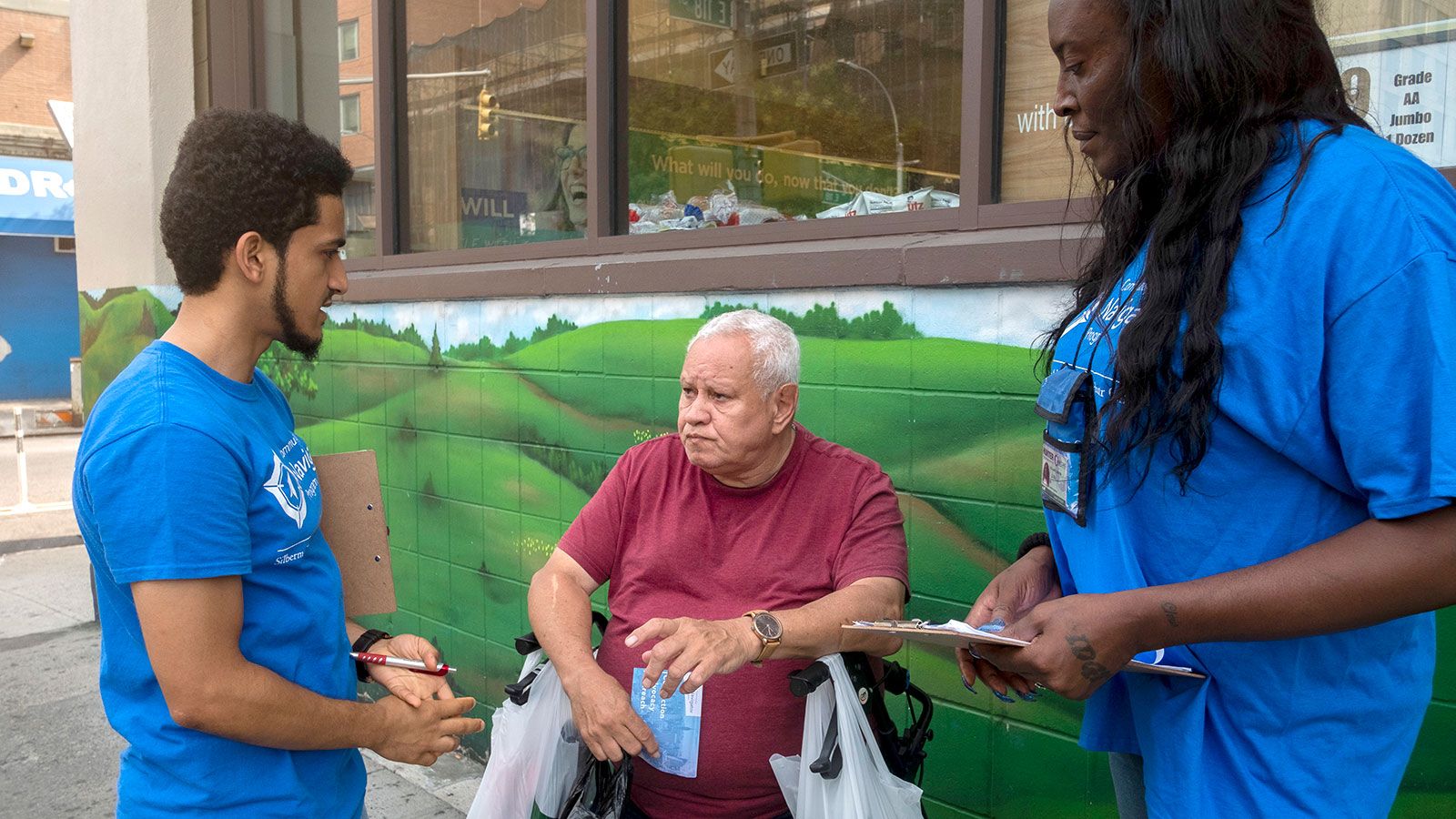Silberman School of Social Work

Faculty and students from Hunter's Silberman School of Social Work collaborate with community-based organizations to identify needs and make positive changes in East Harlem.
Current Projects
Child Welfare Organizing Project (CWOP)
CWOP, co-founded by a Hunter professor, has been working with children, youth and families to reform the child welfare system for more than twenty-five years. Social Work faculty have been engaged in a PSCUNY grant-funded research project focused on the court experiences of child welfare-involved parents, with CWOP as their East Harlem community partner. Another project explores the issues of child abuse and neglect with CWOP parents.
Project dates: 2012–present
Metropolitan Hospital Center Community Advisory Board
The Metropolitan Hospital Center Community Advisory Board serves as a link between the hospital and the community, evaluates patient care and reports to the NYC Health & Hospital Corporation. A School of Social Work professor is a Board Member and Chair of the Patient Care Sub-Committee.
Project dates: 2012–present
East Harlem GIS Comparison/The Community Loss Index: A New Social Indicator
This collaboration between the Silberman School of Social Work and Hunter College's Department of Geography uses the new Community Loss Index — a GIS comparison study of high-, medium- and low-loss neighborhoods — to compare the distribution of community losses in East Harlem with several other New York City neighborhoods. Based on ZIP code-level data, community-level losses examined include: Missing People (due to foster care placement, incarceration, long-term hospitalization and premature death) and Missing Assets (due to unemployment and foreclosure).
Project dates: 2013–present
Advisory Committee for Global Social Work and Practice with Immigrants and Refugees
The Advisory Committee includes key community agencies that advise the School of Social Work’s field of practice. Seven agencies currently serve as collaborative partners, but that list is always growing and evolving. The project has already produced a revised syllabus for a platform course on Global Social Work and Practice with Immigrants and Refugees. It also resulted in revised draft competencies specific to Global Social Work and Practice with Immigrants and Refugees.
Project dates: 2013–present
Silberman Aging
This Silberman-based initiative encompasses a number of East Harlem community-focused projects. Initiative leaders are active participants in East Harlem’s Older Adult Subcommittee (of the East Harlem Community Health Committee). The subcommittee is comprised of dozens of provider organizations serving older adults throughout East Harlem. Silberman Aging hosts an annual conference with over 150 attendees, many from East Harlem agencies. Another of their projects is El Barrio SHARE, a participatory initiative that is designing a training to cultivate “natural helpers” (e.g., store clerks, hairdressers, building superintendents) to identify signs of dementia among Latino elders and connect them to culturally appropriate support services. Silberman Aging is also collaborating with the Institute for Family Health to introduce an interdisciplinary care coordination internship.
Project dates: 2015–present
Community Navigators Program
With the support of the New York District Attorney’s Office, this project has created a community-based agency housed at the Silberman School of Social Work to work with youth and their families underserved by previously existing systems. Twenty-one staff members (including three Silberman MSWs) work in nine sites throughout the East Harlem community (Stanley-Issacs Housing; Little Sisters; Youth Action Youth Build; Exodus; STEPS to End Violence; Mt. Sinai Hospital Adolescent Clinic; Metropolitan Hospital; STRIVE; and Union Settlement).
Project dates: 2016–present
Association to Benefit Children (ABC)
A School of Social Work’s professor serves as Vice President of ABC’s Board of Directors. ABC's East Harlem-based programs adopt a "whole family" approach that responds to the unique, urgent and oft-changing needs of individual children and their family members. ABC is a refuge for impoverished families, offering early childhood education programs for at-risk infants, toddlers and preschoolers, as well as supportive housing, health and mental health services, crisis intervention, family support and preservation, year-round youth development programs and an open door to the community.
Project dates: 2016–present
Opioid Abuse Prevention
In collaboration with researchers at the Weill Cornell Medical Center, a School of Social Work professor is working on a project that addresses opioid abuse in the East Harlem community. Outreach efforts for this project include partnerships with local churches to deliver educational and preventative interventions to family members of individuals who are at risk for developing opioid-use disorders.
Project dates: 2017–present
Past Projects/Events
- 2012 Community Assessment Survey Evaluation
- Aging Re-entry Task Force of NYC
- All In East Harlem Vision Conference
- Bailey House Evaluation Collaboration
- Chronic Disease Self-Management Program Care Coordination Study
- Community Organizing Student Project
- ConNECT: Connecting Neighborhood Elderly to Community-based Teams
- Connections to Care (C2C) Project at STRIVE—NYC
- Creating and Sustaining the Next Generation of Trauma Informed Practitioners
- Culturally Congruent Measure of Mentalization
- East Harlem GIS comparison/The Community Loss Index: A New Social Indicator
- East Harlem Partnership for Employee Assistance Education
- Evaluation of Greenhope Services for Women: A Prisoner Reentry Program
- Evaluation of Intervention for Men Re-entering from Rikers Island
- Financial Literacy Trainings
- Individual Placement and Support Program (IPS)
- Literacy Across Harlem Holiday Book Drive
- Measuring the Effectiveness of Parent Organizing in Child Welfare
- Mexican-American Young Adults Who Drop Out of High School in NYC
- North of 96th Street Public Health Coalition
- Peer Network Support Group: Youth Empowerment Program (YEP)
- Rising For Justice in East Harlem
- School of Social Work & Latino Leadership Institute
- Senior Center Closing Study
- Senior Positive Adaptation
- Silberman Service Week
- Speak Out Harlem (SOHARLEM)
- Support for East Harlem Explosion survivors
- Support Systems in the Lives of Child Welfare-Involved Families
- Targeted Capacity Expansion Program
- The Children of East Harlem, Model Engagement and Service Delivery Matrix
- The Competency Based Curriculum Project
- Union Settlement Naturally Occurring Retirement Community at Franklin Plaza
